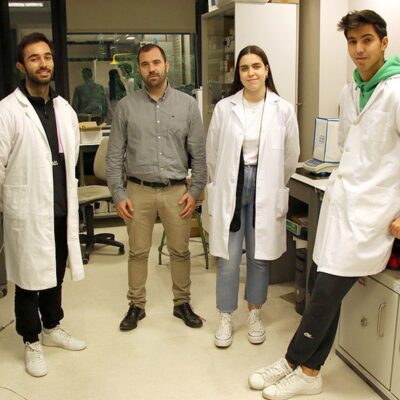This research project, which aims to create a network for the efficient use of green hydrogen in the maritime sector, won the Atlantic Project Award in the Marine Renewable Energy category
The European research project Hylantic (Atlantic Network for Renewable Generation and Supply of Hydrogen to promote High Energy Efficiency), coordinated by researchers from the Department of Chemical and Biomolecular Engineering of the University of Cantabria, received the Atlantic Project Award for the best project in the Marine Renewable Energy category.
The jury took into account the relevance of the project and its alignment with the pillars of the action plan of the European Commission’s Atlantic Strategy, its innovative character, sustainability and capacity to be scalable in other countries. Hylantic‘s aim is to create a transnational network in the Atlantic area for the efficient use of hydrogen applied to the maritime sector, for which it addresses three major actions: one of production through renewable and sustainable energy of green hydrogen, another of efficient and safe storage of this hydrogen and a third of supply in different devices applied to the maritime sector, using technologies such as the fuel cell and combustion engines.
Developments
Alfredo Ortiz, principal investigator of Hylantic project, explained that the main results are the development of new materials and catalysts that “allow the use of electrolysers free of precious metals such as platinum, which are very expensive on the market today, in an efficient way, for the generation of this green hydrogen.” “Different technologies wee developed for the purification of hydrogen from different industrial waste gas streams (membrane, PSA and combined) and two prototype systems were developed using photocatalytic reactors that allow the generation of hydrogen also from industrial liquid waste streams,” he explained.
As for hydrogen storage systems, basically two technologies have been developed: one based on metal hydrides, where the hydrogen storage density has been very high and above what is currently available on the market; and tanks containing an inner protective layer that allows hydrogen to be stored at high pressures with a very high degree of safety.
Finally, the use of this hydrogen was implemented in two systems for the maritime sector: a leisure boat powered by a fuel cell system, which achieves autonomy to navigate in an efficient system throughout the Bristol Channel, and a hydrogen-powered boat with a combustion engine that is currently being used in the Orchid Islands (UK) to transport different goods.
In addition, “different surveys have been carried out at European level to see what the perception of hydrogen is and the future implementation of these technologies in the current energy sector,” said Ortiz. A life cycle and carbon footprint analysis of this type of technology has also been carried out “to compare and see what the impact could be from the generation of hydrogen to its final use.”
Original news: El proyecto Hylantic, coordinado por la UC, recibe un premio a la mejor iniciativa de energías renovables marinas.
Captions:
1.- From left to right, Gonzalo Moral, Alfredo Ortiz Sainz de Aja, Laura Preciados and Daniel González, at the School of Industrial and Telecommunication Engineering of UC.
2.- Alfredo Ortiz receiving the award.






